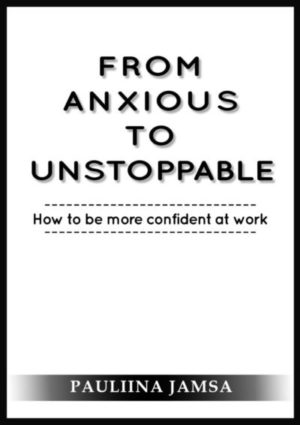And … done!
I looked at the computer screen excited and slightly proud. After spending weeks working on the blog post, it was finally ready! I hovered over the publish button, but decided to read it through once more. Just in case. Okay, all good.
Publish!
I couldn’t help, but to breath a sigh of relief. I had been publishing stuff on LinkedIn before, but mainly on behalf of the company. On my personal news feed I posted insights from events and mainly forwarded articles I found interesting.
This was different.
I had decided to take a risk to improve my personal branding. Something I had been procrastinating for ages as an introvert, INFP.
This was an opinion piece about a topic I was passionate about and I was excited to share it, expecting my contacts and colleagues to find it as valuable as I did.
Why wouldn’t they? It was awesome 🙂
Few hours later I checked my LinkedIn post, butterflies in my stomach.
Nothing.
I carried on with my daily work, not allowing myself to get discouraged.
Well, it’s been just few hours. People need time to read it.
The next morning I refreshed the page.
Still nothing 🙁
Why your social likes and comments are invaluable
At times creating content is like a black hole – you publish it, promote it … but all you get is a radio silence.
It makes you sad and wonder why you spent all that time and effort creating it.
Did it even matter? Do I even matter?
It hurts. Believe me I know. I might be an influencer now, but when I started blogging over 10 years ago, I faced silent rejection every single time I posted.
Why?
Because I was being selfish.
I myself rarely showed any social appreciation to others.
As part of my failure challenge, I want to share with you the misconceptions I had and how actually liking and commenting on LinkedIn became one of the best ways to boost my personal branding and increase my network.
The 3 biggest misconceptions about social liking and commenting
1. If I show my appreciation too much, the value of my likes goes down
I used to think that the less I liked or commented on social channels, the more valuable my “appreciation” was. If you got a reaction from me, it meant that what you published was excellent. Lucky you!
That was silly.
I seriously doubt that any of those people counted how many other posts or blogs I had liked previously.
When I started giving credit whenever credit was due, I realised that the value of my like stayed the same, whether I was giving them out “sparingly” or in abundance.
In fact, the more I appreciated people, the more they started appreciating whatever I posted.
When you like or comment someone’s post, you make their day.
They’ll in return start actively commenting your posts, increasing your social reach and visibility.
Win-win situation, right? 🙂
2. If I like and comment too much, my perceived value goes down among my connections
But I can’t like every single post! My connections will get bored and block me, I hear you say. Yeah, my thoughts exactly few years back.
You know what the magic trick here is?
Don’t simply like. Make a comment that is valuable for your connections. Give them an insight you got when you read the article or the post, share a similar experience you had, or give tips how you solved the problem.
It has positive impact not only for the person who posted it, but you as well. They’ll have much more interesting discussion for their post and you’ll strengthen your position as an expert in the eyes of your connections.
But no one reads the comments!
Well, the last comment I posted got 8 likes in few hours 😉
3. Most of the content on LinkedIn is boring – liking it would compromise my integrity
Ok, not everything in LinkedIn is excellent. Not everything people publish is exciting and new. I was one of the people who looked at the news feed judgmentally.
But hey – What is the LinkedIn for? To connect with valuable people, retain your professional network and to advance your career.
It’s about starting conversations, creating deeper connections and keeping in touch with people you’ve met.
For the person in your network who made an effort to post something, it means a lot if you like or comment it. It might seem boring to you maybe, but remember that it might be the first ever personal post they dared to publish!
We all are not naturally born writers and it’s hugely important that you are there to show your support when they’re taking their first steps.
They’ll never forget you did.
But if I like a cat video and all my connections see I did, doesn’t it affect my credibility?
Yes, indeed it does. That’s called “like hogging” behaviour that shouldn’t get encouraged – it’s our responsibility to keep LinkedIn high quality.
Go to like cat videos on Facebook 😉
The best gift this season is the gift of appreciation
It’s the season of giving and reflection. A lot of us are looking back to the year that passed and planning our goals for next year, one of them being our social profile.
Here’s how you can make someone’s Christmas even better:
- Go to your LinkedIn news feed
- Scroll for a post that would be relevant for you and that you have opinion of
- Like and give an insightful comment
- Repeat 🙂
Come on – not only will your network see your expertise, but your like and comment will make someone smile.
We all need to feel appreciated sometimes.
All the best x
Pauliina
Ps. If you found this helpful in anyway, please do like this or share your thoughts in comments 🙂 Would really appreciate it!
[This is part of my challenge to share one personal failure per week to help you see you’re not alone: we all fail. I hope this will help you to get unstuck and succeed in life 🙂
Related: Top 4 mistakes I made in personal branding
Related: What NOT to do if you are planning a career change
Related: How to get your motivation back


Your openness about the mental hurdles you overcame makes this so powerful!
I was astonished when I got to the part about personal branding and your personality type. I’m an INFP so I related to this piece immensely.
Very helpful indeed, so thank you Pauliina.
Thank you very much, Chuck 🙂 I’m very happy it was helpful, fellow INFP!
A very enlightening content. Boosting our personal branding on LinkedIn is really important nowadays. Thank you for sharing with us your best ways of boosting personal branding in this social platform.